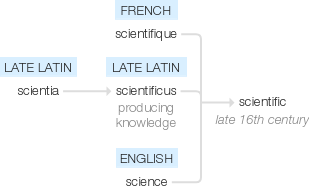Scientific
late 16th century: from French scientifique or late Latin scientificus ‘producing knowledge’, from scientia (see science). Early use described the liberal arts as opposed to the ‘mechanic’ arts (i.e. arts requiring manual skill).
wiktionary
Borrowed from Middle French scientifique, from Medieval Latin scientificus(“pertaining to science”).
etymonline
scientific (adj.)
1580s, from French scientifique, from Medieval Latin scientificus "pertaining to science," from Latin scientia "knowledge" (see science) + -ficus "making, doing," from combining form of facere "to make, to do" (from PIE root *dhe- "to set, put"). Originally used to translate Greek epistemonikos "making knowledge" in Aristotle's "Ethics."
Sciential (mid-15c., "based on knowledge," from Latin scientialis) is the classical purists' choice for an adjective based on science. Scientic (1540s) and scient (late 15c.) also have been used. First record of scientific revolution is from 1803; scientific method is from 1854; scientific notation is from 1961. Related: Scientifical; scientifically.
